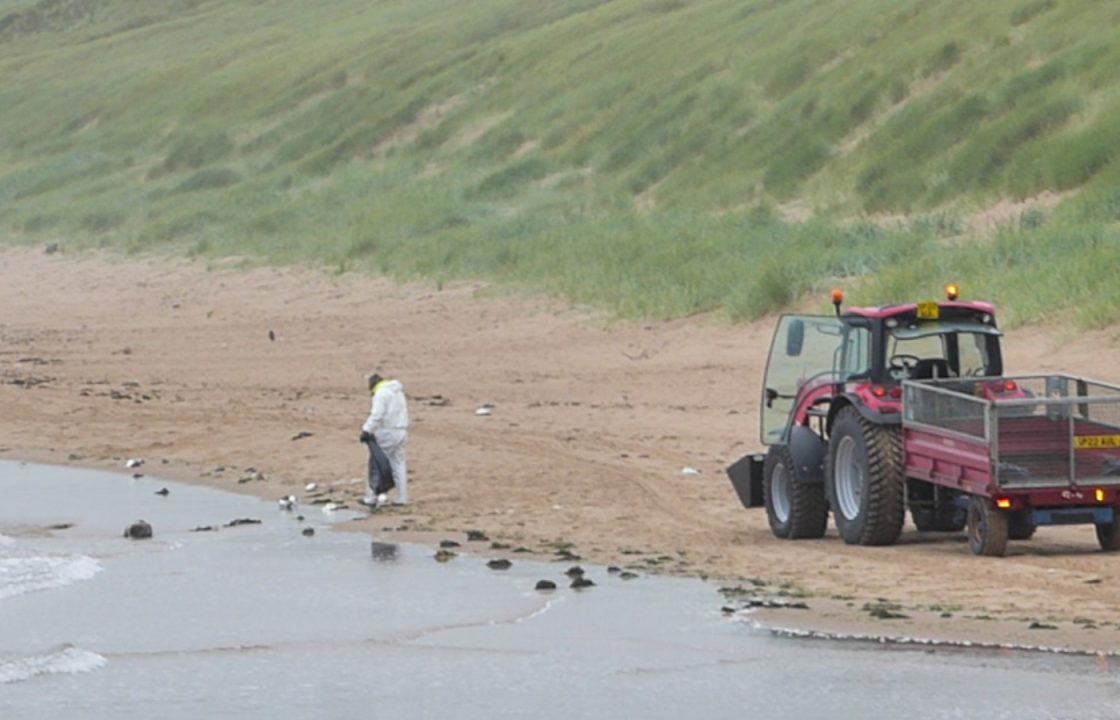The country’s Avian Flu Task Force is on high alert following reports of hundreds of dead seabirds around Scotland’s coasts.
It comes after more than 550 dead birds were removed from beaches on the Aberdeenshire coast in the last two days – prompting the local council to warn the public they should avoid touching dead birds who may wash up.
A total of 330 birds were removed from Stonehaven beach on Monday, and Aberdeenshire council revealed on Tuesday that a further 100 carcasses were removed from the beach as well as 126 from Cruden Bay.
The virus has also been confirmed at NatureScot’s Forvie National Nature Reserve (NNR), with more than 200 Sandwich terns having died at the reserve.
Experts are now working alongside the Scottish Government to determine the exact cause of death for the seabirds.
Alastair MacGugan, a NatureScot Wildlife Manager, said: “Unfortunately after a quieter period we are beginning to see an increase in the number of dead birds being reported through our surveillance network, particularly on the east coast.
“While we are thankfully not seeing the large numbers of dead birds around breeding sites that we did last year, this development is really concerning and we’re working hard with all partners in Scotland’s Avian Flu Task Force to understand what is happening and take action to make our wild bird populations more resilient.
“Testing is key to unravelling just what is happening to our seabirds. We are working with Scottish Government and the Animal and Plant Health Agency to coordinate testing and when possible, to carry out post-mortems on dead birds. This gives us a clearer picture on whether starvation or avian flu is the main cause of the current deaths we are seeing.
“Our Isle of May and Forvie NNRs remain open to the public but we’re monitoring the situation very closely and will review what action might be required if we begin to see a significant increase in mortality.”
The national nature agency for Scotland confirmed that a total of 154 birds have been officially diagnosed with the influenza since October 2022.
Terns, gulls – such as Sandwich tern, common tern, kittiwake, herring gull and black-headed gull – and guillemots are among the species confirmed to have been diagnosed.
The rise of bird flu cases within wild bird populations is resulting in an unusually high number of dead or dying birds being washed up on beaches.
Dr Liz Huphreys, BTO Scotland principal seabird ecologist, said: “It’s clear that our seabirds are still being badly affected by HPAI, despite the fact the scale of mortality initially seemed less catastrophic than last year.
“We need members of the public to submit all sightings of dead birds to BirdTrack and the dead wild birds service. These sightings provide an early warning of where the virus may have hit and allows us to track its movement across the UK.
“It is also vital that we continue to monitor breeding birds via the Seabird Monitoring Programme, which will allow us to assess the losses that have occurred at colonies since 2021.”
Paul Walton, RSPB Head of Species Scotland, said: “Scotland’s breeding seabirds declined by 49% between 1986 and 2019 – before the devastating impacts of bird flu began in earnest last year.
“The outbreak in our wild birds comes on top of huge human pressures and is clearly ongoing. The pattern of impacts is unpredictable and varies across time, space and species.
“The RSPB is leading a programme of seabird surveys and research to understand the impacts and generate updated population figures for affected species, as well as contributing to NatureScot’s mortality reporting system.
“There are many conservation actions that our society could take to address the pressures on our globally important seabird populations and to build their resilience to new emerging threats.
“Now is the time for these to be prioritised and resourced. This deadly form of the virus originated in poultry in East Asia, and then spread to wild birds. It is a new human pressure on our wildlife – we should do all we can to help these incredible creatures thrive into the future.”
Follow STV News on WhatsApp
Scan the QR code on your mobile device for all the latest news from around the country




























